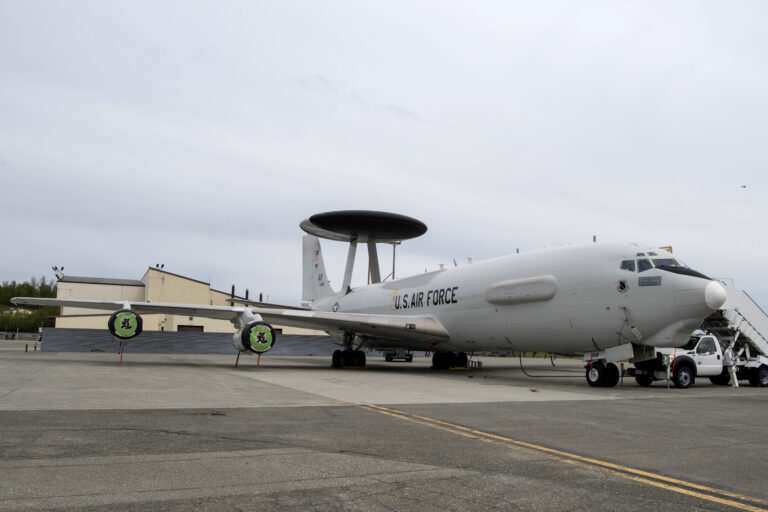
All of the U.S. Air Force’s E-3 Sentry planes were recently grounded to see if they had a faulty part that could cause their tails to fall off, a problem that has recently been discovered on at least two dozen Air Force planes.
Hundreds of refueling and reconnaissance planes have already been grounded in the hunt for defective “vertical terminal fitting pins,” which are meant to help keep a plane’s tail fin attached. In the worst case scenario, one bad pin could result in the tail fin falling off, potentially leading to a crash.
Air Force spokesperson Capt. Laura Hayden would not say how many Sentries needed replacement pins after their inspections Wednesday, Military Times reported. She said “all E-3 aircraft in the field have been inspected,” adding that the “only aircraft requiring inspection are in depot maintenance and will be inspected before leaving the depot facility.”
READ MORE: F-35s grounded after Texas crash
She confirmed to Military Times that “no mishaps have occurred in the E-3” due to “non-conforming pins.”
It was previously reported that bad pins were found in at least 24 KC-135 Stratotanker mid-air refueling planes. Inspections for that fleet have now been completed, but Air Force spokesperson Brian Brackens declined to share the final tally of affected KC-135s, Military Times reported.
Inspections have also wrapped up for RC-135 reconnaissance planes, the radiation-sensing WC-135 Constant Phoenix fleet, and TC-135 training aircraft. All affected planes in those fleets were in depot maintenance and would get new pins before leaving, Hayden said Thursday.
READ MORE: Entire US B-2 stealth bomber fleet grounded
The Air Force has confirmed the authenticity of a leaked memo explaining the faulty pin situation, Military Times reported.
The internal memo posted on an unofficial Facebook page stated that the Air Force had discovered defective pins among hundreds purchased from an individual contractor, some of which had “highly likely” been installed on aircraft during maintenance from June 2020 to December 2022.
The memo stated that “should one pin fail,” remaining pins could not carry the load, and “the vertical stabilizer would depart the aircraft.” Inspecting and replacing the pins is “fairly simple” and “estimated to be a 30-minute task,” according to the memo.
Metallurgical analysis on two faulty pins, purchased from BlueDog Industries, found “incorrect material, undersized dimensions, insufficient plating and lack of shot peening,” the memo stated.
0 comments :
Post a Comment